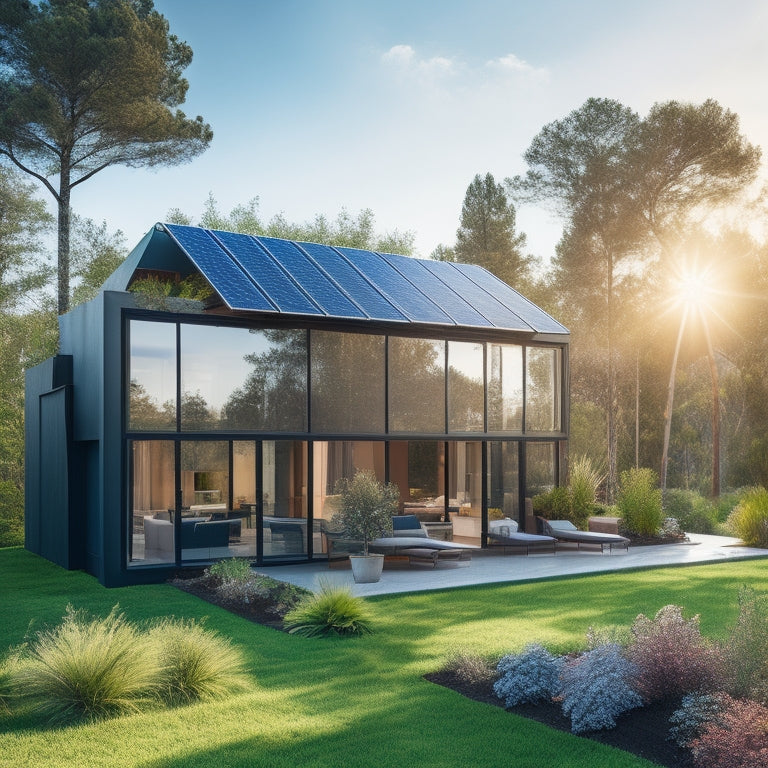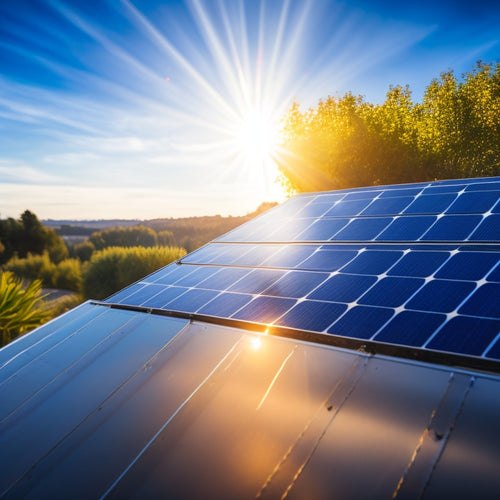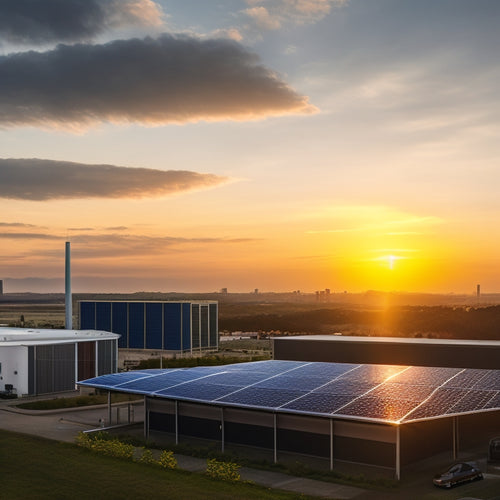
Top Home Panels for a Greener Tomorrow
Share
You're taking a significant step towards a greener tomorrow by considering the top home panels that can utilize the power of renewable energy to reduce your carbon footprint. When choosing the ideal panels, look for high-efficiency options like SunPower Maxeon cells or Panasonic HIT-240 panels, which boast efficiency rates of 22.8% and 21.8%, respectively. Additionally, consider factors like warranty length, temperature coefficient, and price per watt. By understanding energy efficiency ratings, cost-effective panel options, and maximizing energy output potential, you'll be well on your way to creating a sustainable energy future - and there's more to investigate to guarantee you make the most of your investment.
Key Takeaways
- High-efficiency solar panels like SunPower Maxeon cells (22.8%) and Panasonic HIT-240 panels (21.8%) maximize energy harvest and reduce carbon footprint.
- Assess warranty length, temperature coefficient, and price per watt when selecting top solar panel brands for a greener tomorrow.
- Polycrystalline and bifacial panels offer a balance between efficiency and affordability, making them cost-effective options for home solar installations.
- Ideal panel placement, angle, and orientation are crucial for energy output, with regular cleaning and advanced tools optimizing energy generation by up to 20%.
- Durable solar panels with long warranties (at least 25 years) and low maintenance requirements ensure a greener tomorrow with minimal environmental impact.
Top Solar Panel Brands Compared
Three leading solar panel brands stand out among the rest, offering exceptional performance and reliability. You're likely contemplating SunPower, Panasonic, and LG Solar when researching brand comparisons.
As you weigh your options, remember to assess key factors such as energy efficiency and green financing options to guarantee you're getting the best value for your investment.
These top brands have made significant technology advancements, resulting in higher efficiencies and improved durability. SunPower's Maxeon cells boast a 22.8% efficiency rate, while Panasonic's HIT-240 panels offer a 21.8% efficiency rate. LG Solar's NeON 2 panels have a 20.5% efficiency rate.
When comparing these brands, evaluate factors such as warranty length, temperature coefficient, and price per watt. By assessing these key aspects, you'll be able to choose the best brand for your solar panel needs.
Energy Efficiency Ratings Explained
One essential aspect to take into account when evaluating solar panels is their energy efficiency rating, which greatly impacts the amount of electricity generated per unit area. This rating is based on the panel's ability to convert sunlight into electricity, and it's usually expressed as a percentage. The higher the rating, the more efficient the panel is.
| Energy Rating Standard | Panel Performance Metric | Efficiency Range |
|---|---|---|
| IEC 61215 | Peak Power (Wp) | 15%-20% |
| UL 1703 | Module Efficiency (%) | 18%-22% |
| IEC 61730 | Temperature Coefficient (%/°C) | -0.4 to -0.5 |
Understanding energy rating standards and panel performance metrics helps you make an informed decision when choosing the right solar panels for your needs.
Cost-Effective Panel Options Today
As you weigh the significance of energy efficiency ratings in your solar panel selection, you'll also want to take into account the cost-effectiveness of different options.
With various panel types available, it's important to evaluate affordable options that meet your energy needs without breaking the bank.
When selecting a solar panel battery charger, it's imperative to assess high-efficiency solutions to maximize energy harvest and reduce battery drain.
Additionally, evaluating the charging efficiency and compatibility with battery banks is essential for peak performance.
Here are a few cost-effective alternatives:
-
Polycrystalline panels: A popular choice for residential installations, offering a balance between efficiency and affordability.
-
Thin-film panels: A budget-friendly option with lower efficiency ratings, ideal for smaller energy requirements.
-
Bifacial panels: A newer technology that captures energy from both sides of the panel, increasing output while keeping costs competitive.
Maximizing Energy Output Potential
Your solar panel system's energy output potential hinges on ideal panel placement, angle, and orientation. To maximize energy production, it's vital to enhance panel orientation.
Regular cleaning can also improve energy output by up to 25% clean panels for maximum energy.
Thanks to advancements in solar technology, you can now benefit from sophisticated panel orientation enhancement tools. These tools analyze your roof's unique conditions, including shading patterns, roof pitch, and local weather data, to determine the best panel angle and orientation.
By leveraging these observations, you can increase your system's energy output by up to 20%. Additionally, consider using tracking systems that adjust panel angles throughout the day to capture more sunlight.
Panel Durability and Warranty
Thirty years is a common lifespan for solar panels, but some high-quality panels can last up to forty years or more.
When selecting a panel, you want to take into account its durability and warranty coverage. A longer panel lifespan means more years of generating clean energy and saving on your electricity bill.
Here are some key aspects to keep in mind:
-
Look for panels with a durable anodized aluminum frame that can withstand harsh weather conditions.
-
Check the warranty coverage, which should include protection against defects, materials, and workmanship for at least 25 years.
-
Verify the panel's tempered glass or polymer coating can resist scratches and corrosion.
Installation and Maintenance Tips
Optimizing your solar panel system's performance begins with proper installation and maintenance.
You'll want to guarantee that your panels are installed using advanced installation techniques, such as flush mounting and micro-inverters, to maximize energy output.
A well-planned maintenance schedule is also essential to prevent energy losses and extend the lifespan of your system.
You should inspect your panels every six months to clean them and check for damage. Additionally, schedule annual checks with a certified technician to identify and address any potential issues.
Frequently Asked Questions
Can I Install Solar Panels on a Rented Property?
You can install solar panels on a rented property, but you'll need your landlord's permission and a solar lease agreement that outlines terms, including installation, maintenance, and removal responsibilities.
Do Solar Panels Work During a Power Outage?
You might think solar panels can power your home during an outage, but they typically don't; however, you can invest in emergency power solutions, like battery backup systems, to guarantee your solar panel functionality continues to support your needs during a blackout.
Are Solar Panels Suitable for Homes With Skylights?
You're wondering if solar panels are suitable for homes with skylights; the answer is yes, as long as the skylights aren't shaded and aren't directly above the panels, ensuring skylight compatibility and ideal energy efficiency.
Can I Add More Panels to My Existing System?
"Break a leg" by upgrading your existing system! You can add more panels, but guarantee panel compatibility and consider installation costs. Assess your current setup's capacity, then consult a professional to determine the best expansion strategy for your energy needs.
Do Solar Panels Increase My Property Taxes?
You won't necessarily see a direct increase in property taxes due to solar panels, as many states exempt them from property value assessments; plus, you'll likely benefit from tax incentives that offset any potential increase.
Related Posts
-

How Efficient Are Thin Film Solar Cells
Thin film solar cells provide an innovative approach to energy generation, boasting efficiency rates generally betwee...
-

Solar Powered Lights for Sustainable Home Decor
Solar-powered lights offer a stylish and eco-friendly way to enhance your home decor. They capture sunlight, converti...
-

Advantages of Commercial Solar Battery On-Site Storage
By investing in a commercial solar battery on-site storage system, you can greatly reduce your energy grid dependence...


